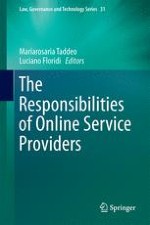2017 | OriginalPaper | Buchkapitel
5. Speaking Truth to/as Victims – A Jurisprudential Analysis of Data Breach Notification Laws
verfasst von : Burkhard Schafer
Erschienen in: The Responsibilities of Online Service Providers
Aktivieren Sie unsere intelligente Suche, um passende Fachinhalte oder Patente zu finden.
Wählen Sie Textabschnitte aus um mit Künstlicher Intelligenz passenden Patente zu finden. powered by
Markieren Sie Textabschnitte, um KI-gestützt weitere passende Inhalte zu finden. powered by
